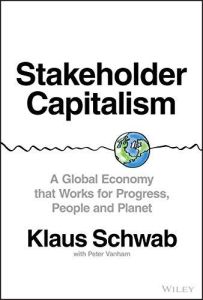Join getAbstract to access the summary!

Join getAbstract to access the summary!
Klaus Schwab and Peter Vanham
Stakeholder Capitalism
A Global Economy that Works for Progress, People and Planet
Wiley, 2021
What's inside?
Short-term priorities created the Earth’s problems, but long-term thinking could offer solutions.
Recommendation
The planet faces existential threats, World Economic Forum leader Klaus Schwab, writing with Peter Vanham, argues in this sobering analysis: Earth is getting hotter, the rich are growing richer and politics are becoming more polarized. Yet Schwab and Vanham also believe that humanity can conquer its current crises if business leaders and politicians shift their mind-sets to more long-term thinking. The authors offer a number of intriguing prescriptions, but their arguments in favor of more unionization and diversity might fail to sway some traditionalists.
Summary
About the Authors
Klaus Schwab is the founder and executive chairman of the World Economic Forum. Peter Vanham is head of chairman’s communications at the World Economic Forum and the author of Before I Was CEO.





















Comment on this summary